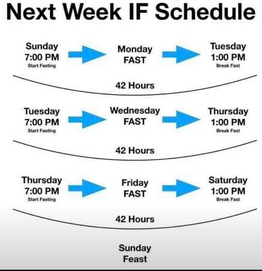 Percent why this forum drew me back
Percent why this forum drew me back 
Is the 5 Stages of Fasting a real thing?
I don’t know how they do this. Really, I don’t. At one time, 40+ pounds heavier, I had no problem fasting 3+ days. Now, I struggle to make it over night (32+ hours). Once. Per week. Tried to get one 36 hour and one 22 hour fast in last week, and made it two 22 hour fasts, but that’s it.
I also think that type of schedule, with no breaks, might lead to lower metabolism. At some point, you have to tell your body you’re not starving, and that schedule seems unlikely to do that.
@monsterjuice and I have been doing this IDM protocol since the last week of October until November 30 (so for a bit over a month).

@Ilana_Rose was suggesting it to someone on a thread, and I saw it and so she explained it to me further, and so Ashley and I thought it would be a great thing for try for a month or so.
I am enjoying it as I take the Fast to 44 hours instead if their 42 as I like doing a 20:4 IF of Lunch at 1pm, Supper at 4:30 and fasting from 5pm-1pm but this has worked well with my family schedule as well.
For the month of December I am planning to do my regular 20:4 and to do a Fast only for the ZornFast (and I will probably do 72 hours for that, as I like partaking in that monthly).
I still have over 100 pounds to lose, so this is easy for me NOW --but; over time, when I am not obese anymore and as I get closer to Maintenance at that point, I might be like you as well, @ctviggen and not be able to do this. I am hoping at that point I can still do some Fasting to get the benefits of Autophagy still though.
You should be able to still fast. I’m sitting at about 115lbs (I’m 5’ 2"). I have a BMI of 21, but 30% body fat (its all in my thighs). I still do a 48-hour and a 72-hour fast a month. But I don’t do much more than that. I like eating 
I’ve seen people who are thin (such as Peter Attia) who can fast 1+ weeks. I just got cold after a while doing fasting and had to take time off. Was that due to my metabolic rate lowering? It’s unclear to me.
Fung seems to believe (or maybe it’s just what I see of his) that one can do these schedules forever. But there are no scientific studies of this.
Thus, why I don’t think Phinney is correct about fasting, it’s unclear to me that we can fast every single week without a break.
I think as long as you’re able to keep a schedule with no issues such as getting really cold or hungry, then maybe it’s ok.
One thing I’m pondering is you cannot out-fast weight gain long-term, the initial weight loss is temporary, it simply quits working until you build muscle to maintain. You would virtually be fasting forever when it is not necessary. Starving yourself then becomes futile and a rhetorical never ending loop.
When you eat food and how your body processes food is why we gain, Fung talks about how the body is not stupid, but it is in-fact stupid because it cannot tell the difference between muscle and adipose fat cells, fat acts like it is muscle tissue but the more muscle you have, the white adipose fat becomes off limits to storage by insulin so when you eat food the muscle volume determines what will stored as fat (not insulin) because muscle tissue releases a chemical called aminoisobutyric acid which causes the white adipose tissue to behave as if it were brown fat so it oxidizes carbohydrates/sugar on the spot immediately as soon as you eat it?
Why those skinny peeps can eat and not gain a pound but eventually it catches up with them when they over-eat and chronically engage insulin…
You can fast and fast and fast but all your doing is encouraging weight gain in the adipose tissue and neglecting your muscle volume, hence the never ending loop stated above.
So in hindsight all your doing is trying to lose body fat without blocking it from occurring to begin with?
@Momof5 I’ve been meaning to comment on this for the last several weeks that I’ve seen you post it, Susan.
It is almost exactly the protocol I followed from mid-May until last week for my alternate day fasts. The only difference is the days of the week and that my start/end times varied a bit. I fasted (the middle column) Sunday, Tuesday, Thursday. I’d finish dinner closer to 6:00 or 6:30 PM but I know for sure a couple of times in there I’d end up having something around 8:00 PM (gasp!) and I’d usually eat by noon instead of 1PM. I pretty much got three 40 to 42 hour fasts in every week.
Oh nice =). Well that is encouraging, it seems to be working for me. I am doing it atm until November 30 and going back to my normal 20:4 TMAD for December. I love this protocol though, so I might go back to it in January. That is very neat that others have been doing this as well, thanks for telling me =).
With doing it last year about the same amount of time as this year, I found it easier some weeks than others. Just like all fasting, I suppose. It’s not a miracle, but it seems pretty close at times!
Rough guess: I did this five months, I’ll call it 20 weeks, that’s 60 days of fasting. Fasting two months out of five.
Yes, I think it is really great. I just thought it might be too difficult to do in December is all. I will still do the Zornfast for 72+ hours in December. I like this protocol, so I am planning on doing it in January again and then see how it goes from there.
WOWwwww - another brilliant bodily function to optimize health once the foundation is nourished enough.
It is a new discovery, I never could quite figure out how the body oxidizes carbohydrates as soon as you eat them only problem is, the more body fat you have the least likely it will work like that.
It is like the muscle tissue is working like an endocrine organ?
But the body (insulin?) thinks white adipocyte tissue is a muscle tissue?
Amino-iso-butyric-acid activates the mitochondria or what little mitochondria is inside the white adipocyte tissue to act more electrical rather than chemical or mechanical?
Thousands of mitochondria inside white adipocytes cells go into electrical mode simultaneously so they basically refuse to store excessive lipid droplets from glucose but instead start burning sugar on contact?
Adipose tissue goes into glucose==>lipid==>glycogen refusal mode?
Just like muscle tissue going into glucose==>glycogen refusal mode?
My n=1 is that I was stalled out in the low 160’s for several months, fasted 72-hrs two weeks in a row and dropped to the mid 150’s. The weight stayed off. Then 6 months later I did the same thing and dropped into the 140’s and it stayed off. OTOH, I’ve had many fasts where I dropped a few pounds and gained it back as soon as I refed. My goal was autophagy so I was ok with that.
Perhaps I have built some additional muscle to maintain the weight loss because I am maitaining 15-20 lbs less on my body basically eating them same things I ate before I did my first fast. My “setpoint” of equilibrium weight was lowered or perhaps my metabolism was increased slightly. Dunno!
That is SO COOL.
Yes to electrical mode and myelination - our bodies have so much water & salt battery potential provided they’re given nutrient density and mitochondrial & HGH optimizing via fasting and/or high intensity strength training!

The keto-cusp:
Theme song:
I was thinking about your post while re-arranging my house for hours now and if your not into weightlifting I would look at my RMR/BMR/EER (they all mean the same thing), I mean you could probably achieve the same thing pumping a little iron but with fasting it would take a lot longer to achieve the desired set-point?
If you can get that muscle volume just up enough (you don’t have be body builder) to out-pace that adipose volume then your set-point is going to rise exponentially in maintaining a certain homeostasis of body fat and lean skeletal tissue volume?
No gyms near where I live but my husband has a weight bench with free weights in the basement I use from time to time. And most hotels I stay in have a set of weights so I try to take advantage of this also.
Dee, I don’t think it’s just hype, but it’s not all accurate.
72 hours, your body is breaking down old immune cells and generating new ones - maybe; I don’t know. I do think there is some ‘resetting’ that takes place when we give ourselves a break from eating and digesting, and I hope this stuff operates, but have no idea of any actual timeline for it.
54 hours, your insulin has dropped to its lowest level point since you started fasting and your body is becoming increasingly insulin-sensitive - yes, this makes total sense. While the gain in insulin sensitivity will differ among different people, insulin indeed generally does continue to decline over time, and the overall picture for insulin and glucagon continues to get better in humans for quite a few days of fasting - and this has application to some of the other claims. Taking them in order:
12 hours, you’ve entered the metabolic state called ketosis  Holy Crow - this is jumping the gun here… At 12 hours the stomach has emptied and the small intestine will have partially emptied (it doesn’t happen all at once; rather - the amount of food in the small intestine trails off). There is still the ‘post-absorptive phase’ to go through (as Dr. Fung calls it), and then glycogen depletion needs to happen before we’ll be into real fat burning and making ketones from that. For many people, this hasn’t completed until the 2nd or 3rd day of fasting.
Holy Crow - this is jumping the gun here… At 12 hours the stomach has emptied and the small intestine will have partially emptied (it doesn’t happen all at once; rather - the amount of food in the small intestine trails off). There is still the ‘post-absorptive phase’ to go through (as Dr. Fung calls it), and then glycogen depletion needs to happen before we’ll be into real fat burning and making ketones from that. For many people, this hasn’t completed until the 2nd or 3rd day of fasting.
Eating ketogenically means likely already being in ketosis, and for the other concerns will speed things up a little - there shouldn’t be as much stored glycogen to go through, but 12 hours still won’t bring much real change at all.
18 hours - you’ve switched to fat-burning mode and are generating significant ketones This will be much the same as for the 12 hour claim. A keto diet will mean you were already there. If not keto, then most likely glycogen depletion needs to be gone through, yet, and ketosis will often be out there in the 2nd or 3rd day.
24 hours, your cells are increasingly recycling old components and breaking down misfolded proteins linked to Alzheimer’s and other diseases - This is the one that bugs me the most.  Here too, glycogen depletion will still have to be completed, so it’s unreasonable to really claim that significant autophagy is increased or started at 24 hours. Insulin and glucagon get more favorable for autophagy through many days of fasting, and mTOR and AMPK - nutrient sensors that are the primary regulators of autophagy - don’t “turn on a dime.” When we fast, mTOR is gradually suppressed, and AMPK is gradually activated.
Here too, glycogen depletion will still have to be completed, so it’s unreasonable to really claim that significant autophagy is increased or started at 24 hours. Insulin and glucagon get more favorable for autophagy through many days of fasting, and mTOR and AMPK - nutrient sensors that are the primary regulators of autophagy - don’t “turn on a dime.” When we fast, mTOR is gradually suppressed, and AMPK is gradually activated.
We don’t know hard numbers for humans, as far as “when does autophagy peak.” I’ve never seen any good evidence or even just solid scientific rationale for claiming that it peaks at 3 days (which is common on the internet), nor that 24 hours is enough to make a substantial difference.
We do know that in mice, autophagy is still increasing after 2 days of fasting, at which time they will be halfway or more to death from starvation. The equivalent time in humans would be weeks or months.
By 48 hours without calories or with very few calories, carbs or protein, your growth hormone level is up to five times as high as when you started your fast - While I doubt this is true for everybody or even a majority of people, I hope something goes on there. Dr. Fung mentions a study of one person where growth hormone didn’t peak until the 26th days of a fast, and it had increased 11 or 12 times by then.
2 days, growth hormone increase, yes, sounds good, and they did say “up to five times as high…”
Good question, Mary. I think even less is known about fasting and any “anti-aging” aspects for skin, versus it’s effects on loose skin from weight loss. During or after substantial weight loss, fasting does mean less loose skin for some people. It really varies.
Dr. Fung says he’s never referred a patient for plastic surgery due to loose skin - I’m not sure if this is an over-the-top claim, or if it’s actually true, or if he just doesn’t do that, even if substantial loose skin results from fasting.
All I can say for sure is that some people do apparently “eat their unneeded skin” while fasting. Also - certain tissues that are not really necessary for keeping the body alive - like scars - will sometimes be consumed. I can testify to that one - had significant scars on both legs for 6 years, and then in 2017 six months of pretty hard on and off fasting made them no longer raised (one leg) or vanish entirely (the other leg).
I think those 22 hour fasts could backfire on you - essentially OMAD - which has issues per IDM. I think the trick is to take entire days off - Monday dinner to Wednesday breakfast at a minimum. That will get the fasting adaptations / responses will at least start to make the fasting worth it.
This might be patient population again.
If this fasting will make the rest of your life so it can be counted in years instead of just months - you’ll have some motivation.

